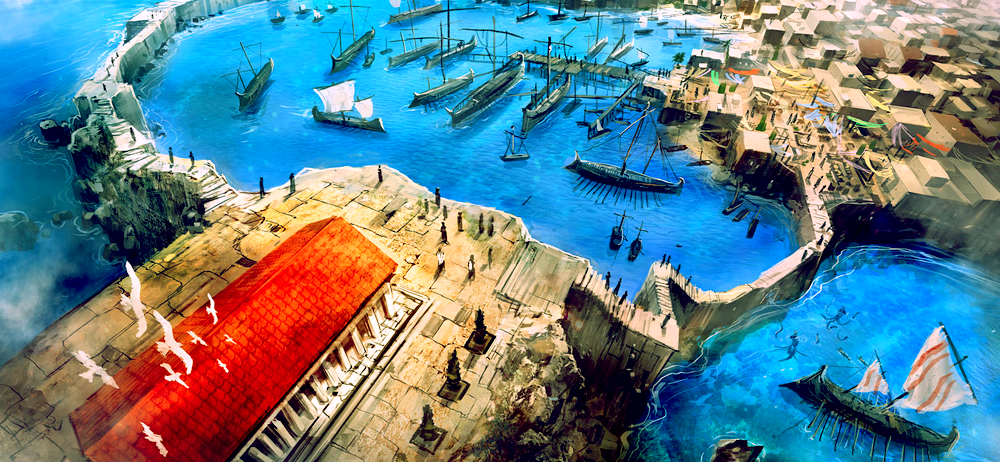Post by flynn on May 18, 2017 4:14:58 GMT
NERO CLAUDIUS
PERCEIVED TO BE IN HER 20s FEMALE SHE/HER BISEXUAL SERVANT THE NEUTRAL FACTION |  |
PERSONALITY Nero gives of an impression of a young man, even the way she talks has some masculinity to it, which makes people believe she was raised as a boy instead of a girl. While her actions to imply that she values valor, Nero refers herself has a maiden. She’s super into herself, and believes everything she does has to be perfect. Nero finds that being called “princess” is an insult because she is a grown women and would prefer that anyone not acquainted to her to address Nero as empress. Her sense of love is quite selfish, when given she expected something in return. Because she could not express her love in a way that can be understood, she did not receive love in return, “while this woman could love more than any other person”, she could not experience the joy of being loved. Nero believes herself to be a tyrant ruler, she knows that she hurt her citizens and met an ugly end. While calling herself as a tyrant, she isn’t quite ashamed of it either. Nero does regret everything she had done to Rome, all that matters is that she was true to herself. |
She is apart of the "Saber" class, so naturally she wields a sword. Aestus Estus is a scarlet long sword that Nero always wields.
COMBAT
Nero possess great swordsmanship, as a Saber it a must. From quick strikes to hard blows to her opponents, she can deal quite a bit of damage. Any skills that she gains are named after a few aspects of her personality. [Though these are in game skills, so this will not be applied for here.]
NOBLE PHANTASM
Aestus Domus Aurea, a theater that was originally designed by Nero herself. It is something that is very precious to her, a theater that was constructed during her reign in Rome. The theater is reproduced in the form of magical energy, which is quite similar to Reality Marbles. She has many advantages within the theater, for example, her opponents are not allowed to leave at any time during her Noble Phantasm.
IMPERIAL PRIVILEGE
An ability that, due the insistence of the owner, Skills that are essentially impossible to possess can be obtained for a short period of time. Skills available included Riding, Swordsmanship, Artistry, Charisma, Military Tactics, etc. This is a personal skill of Nero's.
PARAMETERS
Strength: D
Agility: A
Luck: A
Endurance: D
Magic: B
Noble Phantasm: B
COMBAT
Nero possess great swordsmanship, as a Saber it a must. From quick strikes to hard blows to her opponents, she can deal quite a bit of damage. Any skills that she gains are named after a few aspects of her personality. [Though these are in game skills, so this will not be applied for here.]
NOBLE PHANTASM
Aestus Domus Aurea, a theater that was originally designed by Nero herself. It is something that is very precious to her, a theater that was constructed during her reign in Rome. The theater is reproduced in the form of magical energy, which is quite similar to Reality Marbles. She has many advantages within the theater, for example, her opponents are not allowed to leave at any time during her Noble Phantasm.
IMPERIAL PRIVILEGE
An ability that, due the insistence of the owner, Skills that are essentially impossible to possess can be obtained for a short period of time. Skills available included Riding, Swordsmanship, Artistry, Charisma, Military Tactics, etc. This is a personal skill of Nero's.
PARAMETERS
Strength: D
Agility: A
Luck: A
Endurance: D
Magic: B
Noble Phantasm: B
HISTORY [LOOSELY BASE OFF OF THE REAL NERO CLAUDIUS] [TW: SUICIDE] Nero was born from Julia Augusta Agrippina, while her father was Gnaeus Domitius Ahenobarbus, who is the cousin of the Fourth Emperor, Claudius. Due to her father being considered as weak, Nero was barred from succeeding to the throne. Later on, Agrippina eventually remarried to Emperor Claudius and convinced him to adopt Nero as his heir, leading her down the path of becoming an emperor. During her childhood, Nero was revered as a very competent judge who brought in several important lawsuits with her fairness and efficiency, though Claudius had forbidden her from doing so due to her young age. Nero eventually succeeded her stepfather after Agrippina murdered Claudius in the year 54 AD, she was enthroned emperor at the age of seventeen, which would have been extremely difficult with her origins. After Nero had claimed the throne, she went to the public and gave money to all of the citizens. The public had adored her generosity. Nero attempted to reform a depraved government and the corrupt senate, but her reforms were stalled and met with hostility. Conflicts with the senate erupted when Nero tried to unify the Roman Empire with some troublesome provinces. In contrast, Nero boasted tremendous popularity from the citizens, thanks to her generous policies; her care for diplomacy caused Britannia's relations in Rome to improve during later years, essentially making her the person who built the opportunity for the legend of King Arthur to be born. She was also highly praised by Persia, which lead to Rome being considered "the country of Nero" by Persia after her death. Nero had to bicker between a corrupt Senate and her predatory mother who made policies in self-interest. Agrippina only saw Nero as a tool to become the mother of the emperor. Conflicts with her mother became more pronounced at this time. As a result, Nero hired an assassin to end her mother's life before she could deal with a troublesome senate. But the assassination failed, and the only thing she could do was cut her mother down publicly, proclaiming that her own mother tried to poison her. The year was 59 AD, that was the year that Nero's reputation as a tyrant was cemented. Nero states that since that day, she has been afflicted with headaches. Nero suffered from chronic hysteria, a result from constantly using a silver cup. Nero had been poisoned as a child, so as not to defy her mother she was given the antidote in tandem. When her mother died, she also took the antidote with her to the grave, so Nero lapsed into a fevered delirium. Nero's life then took a radical shift after her ascension. Nero's wife, Octavia, committed suicide. Her younger stepbrother was murdered in order to secure her influence and then drove her sole mentor, the philosopher Seneca, to suicide. Seneca's death affected Nero deeply, she considered him a father figure. According to Nero, she told him that she would forgive him over and over again, but Seneca was skeptical of Nero's word and he ended his life in Nero's house. It pained Nero that Seneca disbelieved her words. Through her selfish actions, Nero was a monster to her relatives, but she boasted popularity with the masses. She established the "Nero Festival" in 59 or 60 AD, which was an athletic conference that took after the Greek Olympics and happened once every five years. She opened three fields for music, gymnastics, and horse riding and openly participated in the events herself. During July 19, 64 AD., there was a large conflagration that occurred to the extent of reducing Rome to ashes. The victims were contained to a bare minimum thanks to Nero's swift and adequate response as an administrator, and she earned immense popularity with the citizens by thoroughly carrying out her subsequent pledges. These measures are highly praised as "effective measures that exhausted the bounds of human intellect" even by the many historians who criticize her. She later established the Domus Aurea theater designed by herself. She was eventually driven out of her position during a revolt in 69 AD, lead by Vindex in Gallia. At first, Nero ignored the situation, perhaps she still trusted Vindex, the inciter of the rebellion. More likely she was suffering from despair and she wished for the situation to go away. Two years later, Vindex would incite another rebellion and by then the senate had enough with Nero. The senate was so displeased with Nero's mishandling of the revolt that they called her a traitor and she was forced to escape from Rome. Nero was convinced that her popular policies and her popularity with the people would protect her from being forced to abdicate the throne. However, the public was silent and they did nothing to protect her. The Roman people had abandoned her, after she had devoted so much for them. She acknowledges that she had made an error in judgement in relying on the people. Still, Nero did not resent them, instead she was saddened by their lack of uproar, "it was my greatest error to love them in a way that they could not understand." She eventually decided to kill herself, though such an end was considered unsportsmanlike by her. She stopped herself many times, having cried about "how can such a magnificent artist disappear from this world?", but as those who betrayed her closed in she quoted a line from Homer's Iliad, "Hark, now strikes on my ear the trampling of swift-footed coursers!", before finally stabbing her own throat with a knife. After Nero's suicide, a soldier delicately wrapped a cloak around Nero's body, "too late. This is fidelity," Nero said. Those were her last words. |
 | FLYNN HE/HIM CST |





